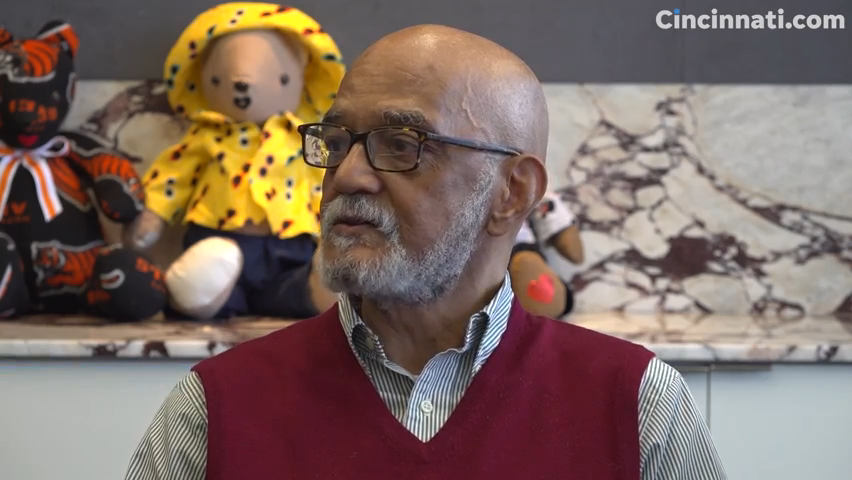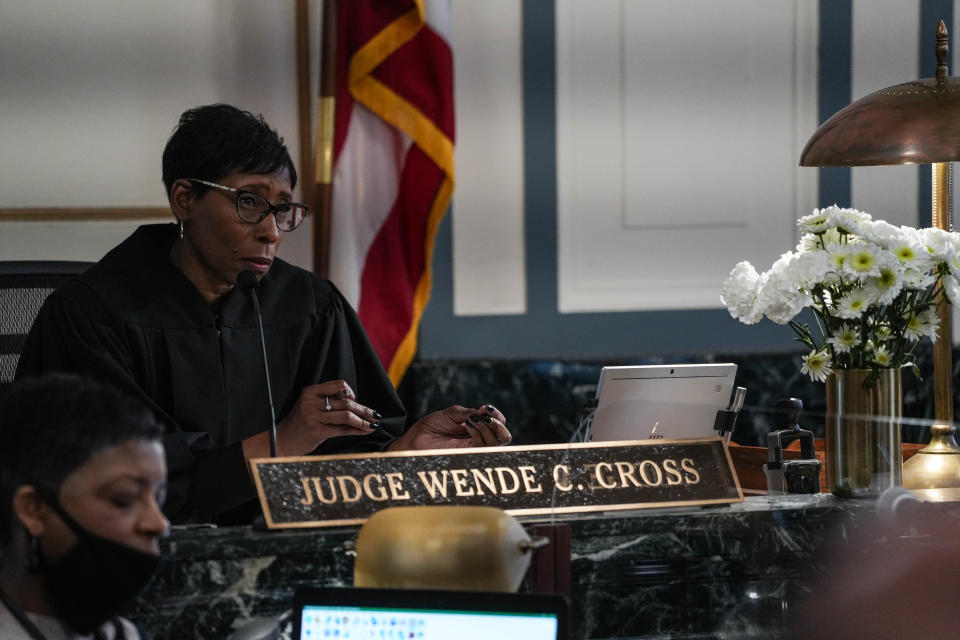Former death-row inmate Elwood Jones: 'I was a thief. I'm not a murderer.'
Every morning since his release from Ohio's death row, Elwood Jones has inched closer toward feeling somewhat free.
He wakes up sometimes at 7 a.m. now rather than the 5 a.m. he was used to in prison. He makes his own coffee. He lets his sister's dog, Cado, outside and then sits at the kitchen table with the American Bulldog quietly keeping him company.
But he isn't really free. While a judge in December overturned the capital murder conviction that landed him on death row in 1996, Hamilton County prosecutors continue to oppose his release, insisting he's the man responsible for the brutal beating death of Rhoda Nathan.

"I can't go out and sit on the front porch," Jones, 70, said in a Tuesday morning interview with The Enquirer, which highlighted his case in the fourth season of its investigative podcast Accused. Jones' release from county jail while awaiting a retrial set for early next year requires him to wear a GPS monitor that only allows him to roam inside his sister's house. The front and back porches are off limits.
Accused:Listen to the latest episode of the true crime podcast about Jones' case
More:Death-row inmate, subject of 'Accused' podcast, granted new trial
It's a strange limbo Jones is in, though he's quick to say he isn't complaining.
"I'm with my sister. My other sister comes and sees me just about every day," he said. "My nephew, we sit and talk all the time and joke, and I see all my nieces and nephews (who) come out and spend time with me.
"I'm at ease, but I'm still lost at times."
Hamilton County Judge Wende Cross overturned Jones' conviction in December, citing more than 4,000 investigative documents that prosecutors withheld from Jones' original defense team. Two prior rulings from the Supreme Court of the United States – 1963's Brady v. Maryland and 1996's Kyles v. Whitley – had established before Jones' conviction in December of 1996 that police and prosecutors are obligated to turn over to defendants potentially exculpatory and material evidence.
The Ohio First District Court of Appeals last week denied prosecutors the chance to reverse Cross' ruling. Still outstanding is a motion aiming to put Jones back in jail while he awaits his retrial. A preliminary hearing is scheduled for April, while Cross scheduled the start of the new trial for Feb. 5, 2024.

It was after the appellate court's ruling last week that Jones said he began "sleeping in" until 7 a.m. That had been the state's "best hope of relief," according to Jay Clark, one of Jones' pro-bono defense lawyers. Jones said that he learned the news that Cross' ruling wouldn't be overturned when another of his lawyers – David Hine, a partner with the Cincinnati office of Vorys, Sater, Seymour and Pease – called him.
"I really couldn't believe it, and I was lost for words," Jones said. "I'm still lost for words, in a sense. Because of all the bad rulings that have come out over the years, it's kind of hard to comprehend when something good happens."
Hine and Clark arranged for Jones to speak to reporters Tuesday for the first time since his release from jail as a way to "correct the narrative, or at least recalibrate it," as Hine said.
"Almost all of the coverage of this case has been through the eyes of the prosecutors, and I think it's sufficient to say that we do not believe that is an accurate lens to view this case through," Hine said.

Jones was convicted in late 1996 of killing Nathan, a New Jersey grandmother who'd come to Cincinnati over Labor Day weekend in 1994 for a family friend's bar mitzvah, while she readied for the day in her Embassy Suites hotel room in Blue Ash. Jones was then employed at the hotel and was known to Hamilton County prosecutors because he had a prior rap sheet, largely for theft.
"I was a thief," Jones said. "I'm not a murderer. I did not kill Ms. Nathan."
Prosecutors have repeatedly declined or ignored Enquirer interview requests about the case since the Accused podcast highlighted investigative avenues police ignored, which included other hotel employees with violent rap sheets. One man not only had previously faced charges for violent crimes but also was reportedly at the hotel in uniform at the time of Nathan's death despite not being scheduled to work that shift.
Details about that employee were among the thousands of pages of investigatory documents prosecutors withheld from Jones' defense team. Other documents included questionnaires filled out by hotel guests after the murder describing suspicious men in and near Nathan's hotel room around the time of the slaying.
Despite prosecutors continuing to call Jones a "murderous bastard" with "a lot of crime left in him," Jones said he harbors no ill will toward police or prosecutors. He acknowledged feeling occasional "bitterness," but said that sentiment isn't directed toward anyone specific.
After all, he said, he had been a criminal prior to Nathan's murder and understands how he landed on the suspect list in her death. Now, though, he said it's time to move forward.

To that end, he spends his days sewing stuffed animals that he showed reporters Tuesday. He gives the toys as gifts to people he considered helpful in his release, including attorneys Hine and Clark. Jones said he learned from his mother how to sew the animals and wiled away some of his time behind bars working on similar creatures and quilts.
"I learned way before this not to be bitter," he said.
He already visited his mother's grave to assure her she could rest in peace. If he gets the chance, he hopes to similarly visit his uncles' graves near Dayton to say the same.
The biggest shocks post-release, he said, have been advances in technology and, on the rare occasion he's been allowed to drive through Cincinnati on his way to court-approved appointments, how much the city has changed.
Asked what the best part is of the bit of freedom he currently has, Jones' eyes teared up as he answered: "For me to hold my nieces and nephews."
This article originally appeared on Cincinnati Enquirer: Elwood Jones, subject of 'Accused' podcast: 'I'm not a murderer.'

